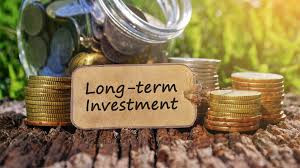
Greetings from Switzerland, dear readers! I hope this finds you all well.
I’m currently enjoying a short vacation, but I wanted to make sure I delivered some valuable insights to you this week, particularly on a topic that is incredibly important for building financial security: long-term investing.
I hope you will find this informative.
And as always: Trade and invest wisely!
In the fast-paced world of finance, it’s easy to get caught up in the allure of quick gains and the excitement of short-term trading.
Promises of overnight riches can be tempting, especially when you’re navigating economic uncertainties.
However, I want to make a clear case for a more deliberate, patient approach: building wealth slowly through long-term investing.
From my experience as a retail trader and investor, I’ve observed the power of compounding returns over decades.
- In Full: Nineteenth post-cabinet press briefing: July 05, 2022
- Ex-UZ chancellor’s trial to restart in September
- Kamungeremu takes over as ZNCC president
- Zim launches Unesco African Film Industry report
Keep Reading
And for our Zimbabwean readers, this perspective is particularly valuable, given the currency fluctuations and economic uncertainties we face at home.
Consider the recent market activity to give you an idea. I always go back to the market movements of Wednesday, April 9, 2025.
The chart I shared before in my writings provided of the trading day after, for instance, offers a stark reminder of this:
The market experienced a notable rally. Some notable performers included Meta (up 14.76%), Amazon (up 11.98%), Apple (up 15.33%), and Tesla (an amazing 22.69%). All these rallies show you how the market performed after that.
The same level of profit might not exist the next day. Building wealth over time is a process and the returns will likely be very varied based on external factors and market conditions.
The core principle here is simple: Investing is a marathon, not a sprint. It’s about making consistent, informed decisions over a long period, allowing the power of compounding to work in your favour.
Trying to time the market and chasing short-term trends is more akin to gambling than investing. You might get lucky occasionally, but you’re far more likely to lose money in the long run.
Albert Einstein supposedly called compound interest “the eighth wonder of the world.” While the quote’s authenticity is debated, the concept itself is undeniable.
Compounding refers to the process of earning returns not only on your initial investment but also on the accumulated interest or profits.
The longer your money stays invested, the more powerful compounding becomes. Even seemingly small annual returns can accumulate into significant wealth over decades.
Consider this simplified example:
You invest US$1,000 and earn an average annual return of 8%. After one year, you have US$1,080. In year two, you earn 8% on US$1,080, resulting in US$1,166.40. In year three, you earn 8% on US$1,166.40, giving you US$1,259.71.
While this is a simplified hypothetical case, the results clearly demonstrate compounding as the results continue to increase as the invested money grows.
The longer you stay invested, the more substantial the compounding effect becomes. This is especially important for Zimbabwean investors, where currency devaluation and inflation can erode the value of savings over time.
Investing in stable international markets like the US and Canada helps you hedge against these risks and preserve your purchasing power.
To illustrate the power of long-term investing, let’s look at a few examples of companies that have rewarded patient investors over the years.
And in the interest of full disclosure, I own MSFT,APPLE in our family portfolio and it’s just an example,not an endorsement of the stocks per se.
Microsoft (MSFT): If you had invested in Microsoft in the early 1990s, during the personal computer revolution, and held those shares until today, you would have seen incredible growth. The company has evolved from its dominance in operating systems and has adapted to the cloud computing era.
Apple (AAPL): Apple has been a tech juggernaut over the last couple of decades. The company transformed from making computers to smartphones, tablets, and services.
Tesla (TSLA): While more volatile, Tesla is a great example of the rewards of investing in innovative companies that are revolutionising an entire industry.
These companies offer a powerful lesson: Invest in companies with strong fundamentals, innovative ideas, and the ability to adapt to changing market conditions, and then stay invested for the long haul.
One of the biggest challenges for investors is managing their emotions. Market downturns can be frightening, and the temptation to sell during periods of panic is strong. However, history has shown that selling during market lows is often the worst thing you can do.
Emotional decision-making often leads to buying high and selling low—the opposite of what successful investing requires. To avoid this trap:
Develop a plan: Create a written investment plan that outlines your goals, risk tolerance, and time horizon.
*Read more on www.thestandard.co.zw
Ignore the Noise: Don’t get caught up in the daily news cycle or the opinions of market “gurus.” Focus on the long-term fundamentals.
Stay Disciplined: Stick to your investment plan, even during market downturns.
Automate: Set up automatic investments and rebalancing to remove the temptation to trade based on emotions.
I understand that investing from Zimbabwe comes with its own set of challenges. Currency fluctuations, political instability, and economic uncertainties can all make it difficult to stay focused on long-term goals.
However, these challenges also highlight the importance of diversifying your investments and seeking stability in international markets. By investing in US and Canadian companies, you’re not only participating in global economic growth but also diversifying away from local risks.
Even if you have a long-term goal of building a stable portfolio, there is a common and understandable feeling that, well that’s what everyone wants so where do I start?
I hope the information in this article has been helpful for you, but I want to reiterate a common theme I share in all my writings and thoughts.
I wish to share that I think that investing is a journey, not a destination. It’s about learning, adapting, and continuously improving your skills and knowledge.
The long term for you and for me may vary, but the underlying principle for building wealth remains unchanged, it is a marathon, not a sprint.
If you’d like further insights, I offer more personal and in-depth consultations on www.streetwiseeconomics.com to discuss your plan moving forward.
Trade and invest wisely and as Always, May the Markets be on Your Side!
*Isaac Jonas is a Canada-based economist and principal consultant at Streetwise Economics. He is also a retail investor, retail trader and content creator, focusing mainly on the US and Canadian capital markets. He regularly shares insights via his social media handles and YouTube channel (Streetwise Economics). His website is www.streetwiseeconomics.com and can be reachable on [email protected]. Insights shared in this article are based on current market conditions, which may be subject to change, hence this article does not amount to investment advice.











